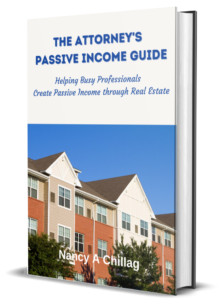Real estate investments are often referred to as one way the wealthy stay that way.
Why is this?
While you may have read about tax benefits, passive income, and how real estate investments are separate from wall street, there’s a twist for high-income earning families.
High incomes typically come with high tax liabilities, especially if you don’t know the ins and outs of tax law, which few of us do. Even if, as a high-income earner, you’re maxing out your retirement contributions, donating thousands to charity, and being creative about write-offs, it’s likely your income continues to push you into a higher tax bracket.
As your household income increases, tax deductions phase out, leaving you with an ever-increasing tax bill and a lot of frustration. This is tough because as you or your spouse achieves promotions and climbs the ranks, you want to be excited, but that looming tax bill might dampen the party.
It used to be that high-income earners were generally self-employed and could take advantage of deductions available to business owners. However, these days, large companies increasingly employ high-profile positions like physicians, attorneys, engineers, and tech professionals in-house. This shift from being self-employed with your own practice to become a W2 employee means a reduction in opportunities for deductions available to you.
That is until you discover REPS – real estate professional status.
In this article, I’ll share all about what REPS is, how achieving real estate professional status can positively impact your tax liability, and why, in this case, it’s beneficial to have one spouse manage the family’s real estate investments full-time while the other focuses on their prestigious career. If you or your spouse is a high-income earner, and you’ve been looking for a way to reduce your tax liabilities even though deductions are phasing out, you’re in the right place!
How Does REPS Help High-Income Earning Families?
Cost segregation studies, accelerated depreciation, and other fancy real estate occurrences often produce on-paper losses for investors, which result in reduced tax liability. Cool, right?
Well, suppose you’re a married couple filing jointly, and you make over $150,000. In that case, you can’t use passive real estate losses to reduce your taxable income because there are no “special allowances” according to the IRS for these high-income families. Those suspended passive losses carry forward until you have a year of passive gains from your real estate investments since passive losses can never offset active income like that from a W2.
(whomp whomp)
Now suppose one of the spouses in this theoretical $150K + earning family designates themselves as a real estate professional and meets the qualifications – then the entire equation flips!
As an example, let’s look at Melissa and her family. Her husband is an in-house attorney for one of the well-known dating apps, and she manages the household, raises their three-year-old, and oversees the couple’s investment strategy. Her husband, Drew, makes $250,000 plus bonuses while Melissa manages the day-to-day activities of their real estate investments, which has quickly turned into her full-time job.
Even though her properties are cash flow positive, Melissa generated $150,000 in losses from her real estate business. Here’s where it gets interesting…
Suppose Melissa has designated herself as qualifying for real estate professional status. In that case, they can deduct all $150,000 in (passive) losses from Drew’s $250,000 (active) income, leaving only $100,000 reflected as taxable income and dropping them into a lower tax bracket.
However, if Melissa does not qualify or doesn’t designate as a REPS, the couple is taxed on all $250,000 of income, approximately doubling the value owed to their taxes.
Without a REPS designation, Melissa’s $150,000 in passive losses must be carried forward until she has passive gains against which she can apply them. Meanwhile, the couple is taxed on Drew’s total income, likely for several years.
If you’re making all the right moves – earning, donating, contributing to retirement, and investing in real estate, why pay more in taxes than you should? REPS helps high-income earning families reduce their tax liability by allowing their real estate deductions to count when they need them.
What Is Real Estate Professional Status?
REPS allows couples to divide and conquer – one high-income earning spouse gets to lean into their profession while the other claims the REPS designation and assumes responsibility for managing all real estate investments’ day-to-day activities, qualifying the couple for significant tax benefits.
Amazing, right? Another cool tidbit about REPS is that there’s no test to pass, formal certification to achieve, or degree you need to earn.
Anyone can claim real estate professional status (REPS) as long as
- More than half the personal services you performed in all trades or businesses during the tax year were performed in real property trades or businesses in which you materially participated.
- You performed more than 750 hours of services during the tax year in real property trades or businesses in which you materially participated.
This is, of course, lined out in detail in IRS Publication 925, but basically, real estate has to be one person’s primary job. There’s not much time in a year beyond the 750 hours required for anything besides maybe a part-time job.
How To Achieve REPS
Now that you can see the benefit of one spouse being the designated real estate professional in the family, you’re probably thinking, “Why have I never heard of this?” or “ How come I’m just finding out about this?” and I couldn’t agree with you more!
Now, you need a plan to put this into action in your own family.
First, you’ll need to decide which spouse will become the real estate professional. You’ve got to divide and conquer if you really want to do this. Neither spouse can be 100% present at work plus manage real estate full time.
For some families, this is easy because one spouse is already the primary breadwinner and the other is a homemaker, but in other families where both spouses are working, the choice may be a little more challenging.
Beyond each spouse’s current income, consider things like career trajectory, passion for career, passion for real estate, other assumed roles as the real estate professional (child care/homemaker?), and each spouse’s ability to single-handedly organize and execute ideas. Consider the trust you have in each other and this renewed commitment each person is making to execute their role to the best of their ability.
No matter which spouse chooses to become the real estate professional, they need to be serious about treating real estate investment management activities as a business.
Discuss REPS and your decision to designate yourself as so with your CPA so that you can coordinate timing, real estate purchases, tax filings, and more. From there, set aside funds to invest, start shopping for your first several investment properties, and track your real estate business activities closely.
Treat your real estate management endeavors like a business by using business bank accounts (separate from your personal finances), an accounting program, and a separate email address for real estate-related communications. Anything you can do to separate your real estate investment management activities from any personal activities and have a provable trail of your 750 hours spent is a good thing!
Making REPS Work For Your Family
Successfully operating real estate investments and achieving REPS status may look different for every family, so let’s look at two different scenarios for clarity:
Scenario 1: Two working spouses, one working full time and leaning into their high-income earning profession, and the other working part-time while materially participating (actively involved) in managing the couple’s real estate investments.
Scenario 2: One working spouse and one homemaker who decides to make managing real estate investments their primary job.
In each scenario, the spouse managing real estate needs to commit to (and be able to prove) their material participation in the day-to-day decisions regarding their real estate properties, accumulating 750 hours or more of tracked time and activities over the taxable year.
For most, it would be challenging to spend 750 hours on just a few properties. So if you accumulate several properties quickly, track your time and business activities managing them, and treat your investment properties as a business, you’re more likely to attain all the documentation required to claim REPS.
Investment management activities that add up to your 750 hours per year may mean establishing business-like formalities and systems, deciding when to raise rents, renew leases, buy, sell, renovate, and more. Approach every day intending to maximize profit while simultaneously improving your tenants’ experience, tracking your time and activities (a Google Calendar is an excellent tool for this!), and coordinating with contractors toward successful renovations, and your investment business and REPS status will be booming in no time!
Usually, the 750-hour requirement is per real estate property, but you can combine all of your real estate management activities from several properties into one by including the following language in your tax returns:
Under IRC Regulation 1.469-9(g)(3), the taxpayer hereby states that they are a qualifying real estate professional under Code Sec. 469(c)(7), and elect under Code Sec. 469(c)(7)(A) to treat all interests in rental real estate as a single rental real estate activity.
That phrase “taxpayer hereby states that they are a qualifying real estate professional” is critical.
If one spouse (doesn’t matter which one) can consistently hit these requirements, coordinate with tax professionals, and find joy in managing real estate investment assets for the family, REPS can be a huge advantage!
Is Real Estate Professional Status For You Or Your Spouse?
If you’re part of a married-filing-jointly relationship and have an income over $150,000, you may have been feeling increasingly frustrated by your high tax liability. In fact, it’s highly likely that you’re thinking about investing or you’re already invested in real estate because of the tax benefits rumors, even if you don’t really know how to use them yet.
However, if you want to apply your on-paper losses to your household’s active (W2) income, achieving real estate professional status may be the answer. Otherwise, you may be stuck carrying passive losses for years to come.
Remember, take the things you’ve learned here as inspiration for more research, an open discussion with your spouse, and food for thought as you further examine the most efficient way to move toward your lifestyle and investment goals.


